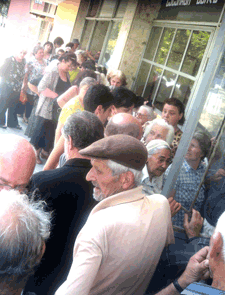 Saba Tsitsikashvili, Gori
Saba Tsitsikashvili, Gori
The majority of the population in Gori still remains without humanitarian aid. Residents of several districts in Gori have not seen any of the food products delivered by countries that are friends of Georgia. There are a small minority of people who have received aid three times a day while others have not been able to obtain anything whatsoever. Local authorities are blaming locals for the problem. According to the Human Rights Center’s information, high-ranking officials of the local government have even threatened people, who have expressed their discontent about the food distribution problem, claiming: “As soon as the Russian troops leave the territory we will teach you a very good lesson.”
“When the bombing started nobody paid any attention to us. Those who were able to run quickly ran away from the city. However, others could not and had to stay behind. Moreover, nobody suggested us what to do. If we really had to flee from Gori, officials should have warned us about it. However, it was actually our public servants who were the very first to run away from the city, “said a resident of Gori.
Most inhabitants of Gori are dissatisfied with the work of local government. People are most grateful to the owner of the shop “Sameba” located in Stalini Street # 4-6 who was not afraid to keep his shop open when Russian troops were occupying the city.
“Firstly, the population should have been informed as where to seek shelter during the recent hostilities. I personally remember that during the communist regime there was one underground bomb shelter in the area of Kombinati district. Nonetheless, I am not sure whether it still exists or not. At least, governmental officials had to take all measures to place local population, who stayed in the city, in civil defense shelters,” said 60-years-old Grisha Atskarunashvili, who did not leave Gori and does not regret as an afterthought.
A middle-aged man, who lives in Stalini Street # 14, said that after they started to speak patiently with Russian soldiers the situation became calmer and people were no longer panicked or scared.
“On August 11 and 12 I was in a village and there the people started to panic that Russian troops were coming into Gori. They had been told that they are burning, looting everything and indiscriminately killing people. My village Khidistavi is close to Gori and immediately left to the city. By that time the situation was calm here. I switched on the TV but nothing interesting was reported about what was going on. Later, however, I looked out of the window and could see the tanks. They stopped at the bridge below my house,” said Shalva G.
At the sight of the tanks the middle-aged man had high-blood pressure. He was alone because his family had found shelter in the village.
“When I became a bit hungry I went down in the street. Luckily the shop was open. I am so grateful to the owner of the shop did not close the shop and continue to sell bread to people. After I entered the shop Russian soldiers followed me in. They paid money and bought something. They explained to the shop-owner that they had Russian money and would buy food according to the currency exchange rate. They bought food and cigarettes. Since that, they visited the shop very often and bought food,” said the man.
Residents of Samefo Street (former Lenini Street) state that Russian soldiers checked all important institutions and offices in the city.
“One morning my neighbor and I went out in the street to seek humanitarian aid. Four Russian soldiers with automatic guns were coming along the Queen Tamar Street. We were scared and lost our way. When they approached us all of the soldiers greeted us with Russian “Zdrastvuite”. Of course we felt relieved and replied back. They entered Public School # 6 and checked everything there,” said Marika T.
The Human Rights Center entered the three-times-bombed city after Russian president Dimitry Medvedev officially declared the ceasefire. His statement had actually only put an end only to the bombarding. Regardless, Gori’s population was a bit relieved and were could walk better under the sun.
One hour later we entered Gori Tank Battalion station Two blown up cars and two damaged tanks were standing at the entrance to the facility. The territory was totally dug up and burnt to the ground. It was sure that the bombs must have been huge based on the size of the holes. It was impossible for anyone to have survived if they had been in the area when the bombs were dropped. Even the trees were shattered and burned as a result of the bombing; the trees were also broken and burnt.
Only one soldier met us at the base who said that 28 soldiers were killed during that bombing in the base. However, nobody knew how many people were injured during the air raid.



